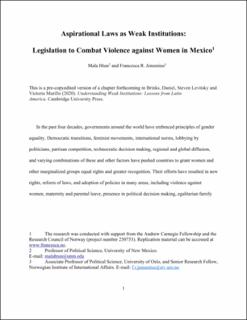Aspirational Laws as Weak Institutions Legislation to Combat Violence against Women in Mexico
| dc.contributor.author | Htun, Mala | |
| dc.contributor.author | Jensenius, Francesca R. | |
| dc.date.accessioned | 2022-11-10T16:52:59Z | |
| dc.date.available | 2022-11-10T16:52:59Z | |
| dc.date.created | 2021-09-08T15:45:36Z | |
| dc.date.issued | 2020 | |
| dc.identifier.isbn | 9781108776608 | |
| dc.identifier.uri | https://hdl.handle.net/11250/3031275 | |
| dc.description.abstract | In the past four decades, governments around the world have embraced principles of gender equality. Democratic transitions, feminist movements, international norms, lobbying by politicians, partisan competition, technocratic decision-making, regional and global diffusion, and varying combinations of these and other factors have pushed countries to grant women and other marginalized groups equal rights and greater recognition. Governments have reformed laws and adopted policies in many areas, including violence against women, maternity and parental leave, presence in political decision-making, egalitarian family law, abortion, reproductive health, and workplace equality. Still, there is significant cross-national variation in the timing and extent of change (see Htun and Weldon 2018). | |
| dc.language.iso | eng | en_US |
| dc.relation.ispartof | The Politics of Institutional Weakness in Latin America | |
| dc.relation.uri | https://www.cambridge.org/core/services/aop-cambridge-core/content/view/604364DD3C56F05CFCEC29EB1FFB2AD7/9781108489331c6_141-160.pdf/aspirational_laws_as_weak_institutions.pdf | |
| dc.title | Aspirational Laws as Weak Institutions Legislation to Combat Violence against Women in Mexico | en_US |
| dc.type | Chapter | en_US |
| dc.description.version | publishedVersion | |
| dc.description.version | acceptedVersion | |
| dc.source.pagenumber | 141-160 | en_US |
| dc.identifier.cristin | 1932552 | |
| dc.relation.project | Norges forskningsråd: 250753 | |
| cristin.ispublished | true | |
| cristin.fulltext | original | |
| cristin.fulltext | postprint | |
| cristin.qualitycode | 2 |
Tilhørende fil(er)
Denne innførselen finnes i følgende samling(er)
-
Academic books and articles collection. Open access publishing by NUPI employees. [561]
Also including chronicles, papers, research reports, etc. from other publishers than NUPI. -
Publikasjoner fra Cristin - NUPI [1426]
